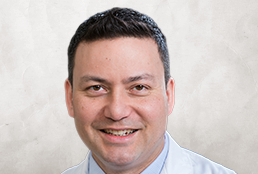An MSFHR-supported project led by CHÉOS Scientist Dr. Christopher Fordyce is shedding light on the medical journey of patients after out-of-hospital cardiac arrest and identifying areas where care can be improved.
Cardiac arrest is when the heart suddenly stops beating and can be due to coronary artery disease or another cause, such as overdose.
“In British Columbia, only 15 per cent of people who have a cardiac arrest outside of the hospital survive until hospital discharge,” said Dr. Fordyce, a cardiologist and the associate director of the cardiac intensive care unit at Vancouver General Hospital “This is a strikingly low survival rate and an urgent area of focus.”

“Despite the fact that 40,000 Canadians per year experience cardiac arrest we know very little about how treatments affect long-term survival, brain function, and quality of life,” he added.
“This is because we didn’t have a complete database that links pre-hospital, hospital, and long-term care information,” he explained.
That is, until January 2019, when Dr. Fordyce and his team finalized the linkages between eight different databases that collect information on the various components of a patient’s journey, from a 9-1-1 call through to community care settings.
One of the main databases used in this linkage is the British Columbia Resuscitation Outcomes Consortium Registry, led by Dr. Jim Christenson, which captures pre-hospital care processes through ambulance records to inform actions like best practices for bystander CPR.
However, this database doesn’t not include data beyond when a patient is admitted to hospital, so, to paint the full picture of care, the linked database uses other data sources like the Medical Services Plan (MSP) databases.
Linkage with other data sources extends the scope of what we know about each patient’s care trajectory and will allow Dr. Fordyce to examine where and when there are opportunities to improve care.
A Wealth of Information
Dr. Fordyce’s project will involve analyzing this comprehensive, newly linked database to identify key care and knowledge gaps in our care processes.
“We are interested in understanding the effectiveness of our current practices in the real world and how they affect long-term outcomes for patients,” said Dr. Fordyce.
This information can then be used to inform evidence-based strategies and policies to improve patient survival and health.
For example, we know that bystander CPR can improve survival to hospital, but there is very little information on whether it affects post-discharge survival. This project will allow the researchers to make recommendations for care guidelines and policies by understanding what works over the long-term.
The database may also be used to develop methods and tools to prevent some cardiac arrests from occurring in the first place.
“There may be a number of symptoms and diagnostic test results that could predict upcoming cardiac arrest, but this area is largely unexplored,” explained Dr. Fordyce “By systematically describing what conditions and medications precede cardiac arrest, we can start to guide clinical decision making and intervention.”
Constant Collaboration
As the project unearths potential areas of improvement at different stages of the care pathway, engaging with key knowledge users will be an important component of the project’s success.
“As we have done with previous projects, we are engaging with frontline workers and administrators to put our findings in context with the real world,” said Dr. Fordyce.
This means understanding the barriers and facilitators to change, both in pre-hospital knowledge users, such as paramedics and bystanders, and in in-hospital professionals, like cardiologists and emergency physicians.
The database will also be used to test the effectiveness of interventions into the future. For example, if early analysis suggests that defibrillator implantation during hospital stay may be an important predictor of survival, the database can be used to recruit study participants and coordinate long-term follow-up to fully investigate this intervention.
Dr. Fordyce’s project is funded through MSHFR’s 2019 Health Professional-Investigator Program. CHÉOS Scientists Drs. Karin Humphries, Jim Christenson, Brian Grunau, and Nathaniel Hawkins are project collaborators.



